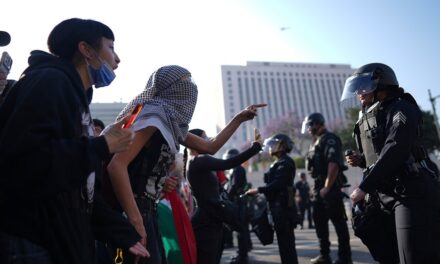In a recent statement that has sparked considerable debate and dialogue in political circles, Representative Crockett, a rising star in the Democratic Party, accused her Republican adversaries of attempting to undermine the progress made by marginalized communities. Crockett’s audacious remarks have drawn attention as she suggested that her opponents would metaphorically “throw her back in chains,” a phrase steeped in historical significance and emotional weight.
This provocative claim comes amidst escalating tensions between the two parties, particularly as both sides gear up for the upcoming election cycle. Crockett, who has emerged as a vocal advocate for civil rights and social justice, stood firm in her denunciation of what she perceives as a broader trend of Republican-led policies aimed at rolling back hard-fought gains in equality and civil liberties. Her comments echo sentiments shared by many in her party who contend that certain legislative trends pose a direct threat to the freedoms and rights previously achieved.
“The actions and rhetoric we are witnessing from my Republican colleagues suggest they would rather see us revert to a time where people were oppressed and silenced,” Crockett stated during a press conference. “It feels eerily reminiscent of past injustices, and I refuse to let that history repeat itself. We must stand firm against these attempts to throw us back in chains.”
Crockett’s use of such charged language certainly aims to capture attention, and it has done just that. Politicians and commentators from both sides of the aisle are weighing in on her words. Some praise her boldness, arguing that it reflects a necessary urgency in addressing systemic issues. Others criticize her for what they see as incendiary rhetoric that could deepen division rather than foster dialogue.
To understand the foundations of Crockett’s assertions, it’s important to consider the legislative context. Over the past few years, various laws proposed or enacted in Republican-led states have been labeled by critics as regressive, particularly in areas such as voting rights, reproductive health, and education. For instance, several states have passed laws that critics argue disproportionately affect voters of color, effectively utilizing various tactics that some interpret as modern-day voter suppression.
“We’re seeing a disturbing pattern in legislation that aims to disenfranchise communities that have fought incredibly hard to secure their rights,” Crockett continued. “The narrative pushed by some of my opponents claims to prioritize security and order, but what it really does is create barriers to access and opportunity for many.” This sentiment is increasingly echoed by activists and advocates who argue that disparities in representation and resources are far from resolved.
Furthermore, the rhetoric surrounding social issues has also become a battleground for the ideological warfare between the parties. Recently, several states have enacted restrictive abortion laws followed closely by judicial challenges. Crockett is firm in her belief that such measures are attempts not only to restrict personal freedoms but also to maintain control over populations that have historically faced oppression.
“It’s not just about individual rights; it’s about overall societal progress,” she stated. “We cannot allow our rights to be dictated by those who wish to turn back the clock on our democracy.” Such words have resonated with many constituents who feel that their voices have been marginalized or ignored in the current political climate.
This fierce political climate has led to an uptick in grassroots movements across the nation. Many community organizers report an increase in participation from individuals who are passionate about civil rights and social justice. Engaging younger voters and those traditionally underrepresented in the political process has become a key priority. This demographic shift is evident in recent election turnout numbers, reflecting increased engagement on issues seen as critical for the future of democracy.
While Crockett’s comments have ignited fervent discussion, they also speak to a broader trend within the Democratic Party, which seems to be embracing more assertive, outspoken leadership. Much of this shift is fueled by a rising sense of urgency among party members who believe that the stakes of the current political environment have never been higher.
As the political landscape continues to evolve, both parties are grappling with finding a balance between maintaining traditional support bases while also appealing to newer, more diverse constituents. Tensions are rising within Republican ranks as they navigate internal disagreements over how closely they wish to align with the more extreme elements of their party that have been increasingly vocal in recent years.
Critics of Crockett’s statement argue that such language could alienate potential allies and voters from outside her base. They contend that while it is essential to advocate for social justice, employing historical references related to systemic oppression may polarize the conversation further. In a time when discourse is already charged, opponents advise caution in messages that could easily be interpreted as incendiary.
Amidst all this, supporters of Crockett assert that her boldness is precisely what is needed to break through the noise of conventional politics. They highlight the necessity of passion and urgency in conversations about civil rights, especially in an era where it often seems that gains are being challenged rather than celebrated. As public sentiment increasingly favors progressive values, advocates for Crockett argue that asserting the gravity of these issues is more essential than ever.
Looking ahead, Crockett is expected to continue driving this messaging as she campaigns for her seat and rallies support for fellow Democrats. With the 2024 elections looming on the horizon, her rhetoric not only reflects the voice of her district but also the ambitions of many who believe it’s crucial to tackle inequalities head-on.
“We are in a fight for the soul of our nation,” Crockett affirmed, as she concluded her statements. “We can’t afford to be quiet; we need to ensure that we advance, not regress. The chains of the past must remain broken.” This firm resolution serves as an emblematic rallying cry for her supporters and a clear indication of the direction she believes the future must take.
The dialogue surrounding Crockett’s comments is far from over. As both parties navigate their positions and forge plans heading into the competitive electoral year ahead, the phrasing “throwing back in chains” will likely reverberate throughout discussions about civil rights, social justice, and the very essence of democracy itself.
As the political landscape shifts and evolves with each passing moment, observers from both sides are refreshing their perspectives on not only what is said but how it resonates within the hearts and minds of American citizens. With movements for justice rising and voices becoming bolder, it seems that the conversation around the themes of liberty, equality, and social responsibility will remain at the forefront as the nation steps into a significant election year.
































